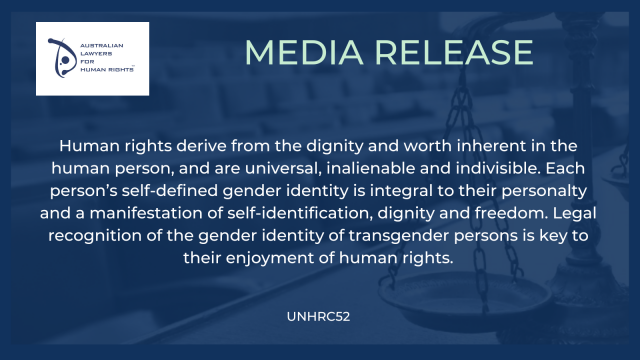28 countries at United Nations Human Rights Council reaffirm importance of self-determination for trans and gender diverse people

Australian Lawyers for Human Rights (ALHR) commends the 28 UN member states from 4 continents who have called on states to develop laws and policies that allow self-recognition of gender identity based on self-determination.
Australia joined with Argentina, who delivered a statement on behalf of the group of states to reaffirm that human rights derive from the dignity and worth inherent in the human person, and are universal, inalienable and indivisible. The statement notes that ,, “..each person’s self-defined gender identity is integral to their personalty and a manifestation of self-identification, dignity and freedom. Legal recognition of the gender identity of transgender persons is key to their enjoyment of human rights.”
ALHR LGBTI Rights Co-chair, Georgia Burke said, “Australia is on the international public record as supporting the right of trans and gender diverse people to self-identify their gender, yet in some Australian states, most particularly New South Wales, trans and gender diverse people are still required to undergo expensive,often unwanted, surgeries and other medical interventions in order to access identity documentation that reflects their gender. This is intolerable, and swift action must be taken to legislate change.”
ALHR Vice President and Co-Chair of LGBTI Rights, Nicholas Stewart, said, “ALHR echos the concerns of the 52nd Session of the United Nations Human Rights Council (UNHRC) as to the increasing proliferation f of disinformation activity and anti-trans rhetoric which overlooks disproportionate levels of violence against trans people, particularly trans women.
The responses to anti-trans protests in places like Hobart, overwhelmingly in support of the trans and gender diverse population, hopefully sends a clear message to our trans and gender diverse community are loved and supported. But it is not enough. New South Wales (NSW) has a new state government and it must heed local and international calls to implement laws and policies that are consistent with human rights standards. NSW law should allow the recognition of gender identity based on self-identification. Reforms are also needed to prevent and respond to sexual and gender-based violence and provide expanded protections against discrimination, including for women in all their diversity.”
Ms Burke concluded, “In response to an ACON survey question asking whether a Labor government would reform the Births, Deaths and Marriages Registration Act 1995 (the Act) to allow trans and gender diverse people to update their gender markers on birth certificates through a simple administrative mechanism, including without the need for surgical or medical interventions, Labor responded that they would “review these provisions in consultation with the community and trans and gender diverse communities”.
“ALHR calls on the NSW Government to live up to and strengthen this commitment , such that the legislation to make the necessary changes to the Act are introduced within the first year of this term of parliament Failure to do so is a failure to live up to international commitments made by Australia before the UNHRC.”
Media Contact: To arrange an interview with Georgia or Nicholas, please contact Matt Mitchell



